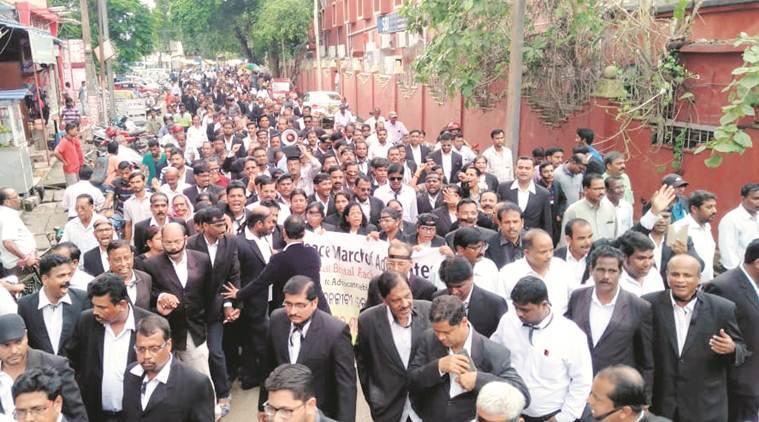 On October 29, the lawyers’ protest turned political after some of them opposed an attempt by BJD-affiliated lawyers to enter the HC premises in Cuttack and end the protest.
On October 29, the lawyers’ protest turned political after some of them opposed an attempt by BJD-affiliated lawyers to enter the HC premises in Cuttack and end the protest.
The crisis in Odisha’s judicial system due to a cease work strike by lawyers for the past two months seems set to have grave legal, administrative and economic implications for the state. On August 28, a lawyer Debi Prasad Pattnaik was allegedly beaten up in public by policemen in Cuttack. Lawyers in Odisha subsequently began a protest that has brought courts to a grinding halt.
“We are steadfast in our demands that all four policemen should be arrested under Section 307 of the IPC (attempt to murder)”, said High Court Bar Association Secretary Satyabrata Mohanty, adding that only two personnel were arrested and later granted bail.
The Odisha Havildar, Constable and Sepoys Confederation had appealed to the protesting lawyers to not press for the arrest of the police personnel. Santosh Satpathy, president of the confederation, had said that all its members will go on strike if the policemen were arrested “under pressure”.
The state government has not stepped in to resolve the situation despite appeals by the public and opposition political parties.
On October 29, the lawyers’ protest turned political after some of them opposed an attempt by BJD-affiliated lawyers to enter the High Court premises in Cuttack and end the protest. The lawyers, associated with the BJD Legal Front, wanted to end the protest after effigies of Chief Minister Naveen Patnaik were burnt.
Meanwhile, in Bhubaneswar’s Jharpada Jail, special camp courts set under the direction of the High Court continue to release prisoners involved in petty offences. Jail-in-charge and Superintendent of Jharpada Jail, Dhirendranath Barik, told The Indian Express that detainees who have committed small acts of theft or engaged in fights are being granted bail by the presiding judicial officer.
“The cases that get bail are usually related to offences that merit less than seven years’ imprisonment or where the valuation of articles stolen is below Rs 20,000,” Barik added.
“The prison reform volunteers draw up a list of inmates with petty offences. The paralegals present the facts of the case, which are being heard by district judges, sessions court judges and sub judicial district magistrates since a proper court system is not available,” described R N Swain, Superintendent of Cuttack’s Choudwar Circle Jail.
“Choudwar Circle Jail, with a capacity to accommodate a little over 700 prisoners, at one point saw numbers almost double. But things are much better now,” Swain said.
“It is not just about numbers,” explained Barik. “As per prison guidelines, we should not be imprisoning people indefinitely. They have human rights.”
As per the Home Ministry’s Model Prison Manual for the Superintendence and Management of Prisons in India, “the State shall endeavour to evolve proper mechanism to ensure that no under trial prisoner is unnecessarily detained. This shall be achieved by speeding up trials, simplification of bail procedures and periodic review of cases of under trial prisoners”.
However, trials of inmates with grave offences continue to remain in limbo.
The Odisha High Court, which is not functioning since August, is also unable to hear matters that have important administrative and economic consequences for the state. The current week’s cause list, released on the Court’s website, shows matters that await hearing and involve the revenue and healthcare departments, Odisha State Medical Corporation, Odisha Mining Corporation and public interest litigations.
“This is a very difficult situation administratively and the state government should defuse it,” said a senior bureaucrat with the state revenue department.
Budhadeb Routray, a well-known lawyer practising in the High Court, summarised the situation. “Because of this situation, there are lot of cases pending with grave financial and policy implications — matters related to taxation, mining and tenders.”